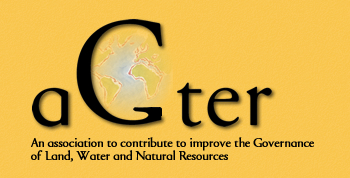
|
AGTER, with E-Sud Development, AREN, and the LandNet West African network has realized a educational kit and a film about the Lessons Learned from Niger’s Rural Code.
We have decided to emphasize this original process as it succeeded, through 20 years of participatory approach, in reducing both the number of land conflicts and their violence. It also contributed to improve patterns of governance at the different territorial levels. The Rural Code is now a benchmark for rural development (...)
Why this Project ?
About twenty interviews were carried out to create this set of educational tools. The film was shot in about three weeks in June 2010, just before wintering. It was edited in September, and additional documents were written. The first screenings of the film took place in November in Niger, Burkina Faso and Senegal.
Systems for the management of natural resources currently undergo some redefinitions, and decentralization policies are progressively being implemented in (...)
General Introduction : Niger’s Facts and Figures Striking Demographics Total population : 15 878 271 inhabitants (2010) Total fertility rate : 7,75 children per women (2009) Population growth rate : 3,3% Population under age 15 : 49,6% (2009) Severe Underdevelopment GDP per inhabitant in US dollars PPP value: 700 (2008) HDI : 0.340 (182th and ranking last in the world chart in 2007) Population living with less than 1/ less than 2 dollars a day : 62,1% / 86% Child and infant (...)
The Rural Code : Definition, History and Objectives
Land tenure, agropastoralism and food security are central issues for Niger. In order to effectively manage land and natural resources, and to tackle food insecurity and environmental degradation, Niger introduced an original and groundbreaking instrument : the Rural Code. What is the Rural Code ? Why and how was it developed ? What are its objectives ?
Creation and Development of the Rural Code
During the colonial era, there was no (...)
The Rural Code : Legal and Institutional Framework
The Rural Code is a key element of the Nigerien national policy on rural land tenure and the management of natural resources. It hinges on a legal system (composed of all the rules and regulations concerning land tenure and natural resources management) and an institutional system (a group of institutions that implement and monitor those rules). The two systems apply at different levels, from the local level to the national one.
Legal (...)
The Rural Code and the Pastoralist Issue
Niger is a pastoral country. However, despite its crucial economic, social and cultural impact, pastoralism remains a very uncertain activity, and Niger’s successive governments didn’t invest much in it (1% of the national budget in 2009, versus 35% for farming activities). Though from 1993 the Rural Code has produced a number of rules and regulations in order to protect and revitalize pastoralism, it was also often accused of favoring crop farmers (...)
Progress Made by the Rural Code l
Since its inception in 1993, the Rural Code in Niger has been designed as a never-ending process. The legal texts that make up the Rural Code, like the institutions which ensure its implementation, are constantly evolving. How far have we come today in implementing the Rural Code? Has its legal arm fostered significant progress in terms of rights? How effective is its institutional mechanism? Overall, what achievements can be attributed to the Rural Code (...)
Shortcomings of the Rural Code and Challenges for the Future
The Rural Code helped developing a more collegial and participatory policy on land and natural resources in Niger, offsetting the power of customary chiefs, and lessening land disputes. It also lead to the development and strengthening of broader development strategies at the national level. However, the Rural Code also has some shortcomings, and the whole process is far from being successfully achieved. Though most stakeholders (...)
|




